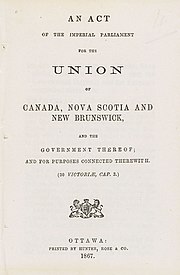User:Mr Serjeant Buzfuz/Colonial Building v AG Quebec
| This is not a Wikipedia article: It is an individual user's work-in-progress page, and may be incomplete and/or unreliable. For guidance on developing this draft, see Wikipedia:So you made a userspace draft. Find sources: Google (books · news · scholar · free images · WP refs) · FENS · JSTOR · TWL |
| Colonial Building and Investment Association v Attorney General of Quebec | |
|---|---|
 Cover page of the British North America Act, 1867 | |
| Court | Judicial Committee of the Privy Council |
| Decided | December 1, 1883 |
| Citation | [1883] UKPC 59, 9 AC 117 |
| Case history | |
| Appealed from | Quebec Court of Queen's Bench |
| Court membership | |
| Judges sitting | |
| Case opinions | |
| Decision by | Sir Montague E. Smith |
| Keywords | |
| Division of powers; federal power to incorporate companies; provincial property and civil rights jurisdiction | |
Colonial Building and Investment Association v Attorney General of Quebec is a Canadian constitutional law decision of the Judicial Committee of the Privy Council in 1883, at that time the highest court of appeal in the British Empire, including Canada. It was decided under the British North America Act, 1867, now known as the Constitution Act, 1867.
The Colonial Building and Investment Association was a company incorporated by a federal statute. It did business in the province of Quebec, in the development of buildings and other construction projects. Acting on information from a shareholder, the Attorney General of Quebec applied to have the courts declare that it was improperly incorporated, since its business was alleged to be entirely in areas of provincial jurisdiction.
The action was dismissed by the Superior Court of Quebec, but allowed by the Quebec Court of Queen's Bench. The company then appealed to the Judicial Committee, which allowed the appeal and held that a federally incorporated company could carry on business in subjects under provincial jurisdiction, provided it complied with the applicable provincial laws.
The case was one of the first cases dealing with the scope of the federal incorporation power and its interplay with provincial jurisdiction over property and civil rights in the province. It has been cited by several other decisions of the Judicial Committee and the Supreme Court of Canada.
Origins of the dispute
[edit]The Colonial Building and Investment Association was incorporated by a federal statute in 1874, on the petition of a group of investors in Montreal, Quebec. The objects of the company were to buy and sell land for the purposes of building "an improved class of villas, homesteads, cottages and other buildings and premises". The company could also maintain an investment fund, for individuals who wished to invest in the objects of the company.[1] The company became a major developer in Montreal, known for its luxurious buildings, with avant-garde and innovative architectural features. The investment fund was also financially innovative, with the company becoming one of the first true trust companies in Quebec for investment and mortgage purposes.[2]
A dispute arose between the company and one of its shareholders. The company sought to recover calls made upon the shareholder. The shareholder disputed his liability, arguing that the company was not legally incorporated and that it was insolvent. The shareholder filed a complaint with the Attorney General, who became involved.[3]
Decisions of the Quebec courts
[edit]The dispute went to trial in the Superior Court of Quebec. The shareholder argued that the company had been insolvent when the shares had been transferred to him. He also argued that the company had not been legally incorporated. This argument was developed by the Attorney General, who argued that the since the business of the company was all governed by provincial law, under provincial jurisdiction over property and civil rights,[4] the company had not been properly incorporated. The Superior Court held in favour of the company, ruling that the company was solvent and properly incorporated to carry out its business.[3]
The Attorney General appealed to the Quebec Court of Queen's Bench, which allowed the appeal by a 4–1 decision.
Queen's Bench [5]
Decision of the Judicial Committee
[edit]Significance of the decision
[edit]Pioneer Trust John Deere Bonanza creek Companies Ref
References
[edit]- ^ An Act to incorporate the Colonial Building and Investment Association, SC 1874, c. 103, Preamble.
- ^ David B. Hanna, Montreal, A City Built by Small Builders, 1867–1880, Ph.D. Thesis, Department of Geography, McGill University, Montreal (March 1986), pp. 194, 196, 227, 232; available from escholarship, McGill University.
- ^ a b Colonial Building & Investment Association v Attorney General of Quebec (1881), 4 LN 374 (Que. SC).
- ^ Constitution Act, 1867, s. 92(13).
- ^ Colonial Building & Investment Association v Attorney General of Quebec (1882), 5 LN 116 (Que. QB).

